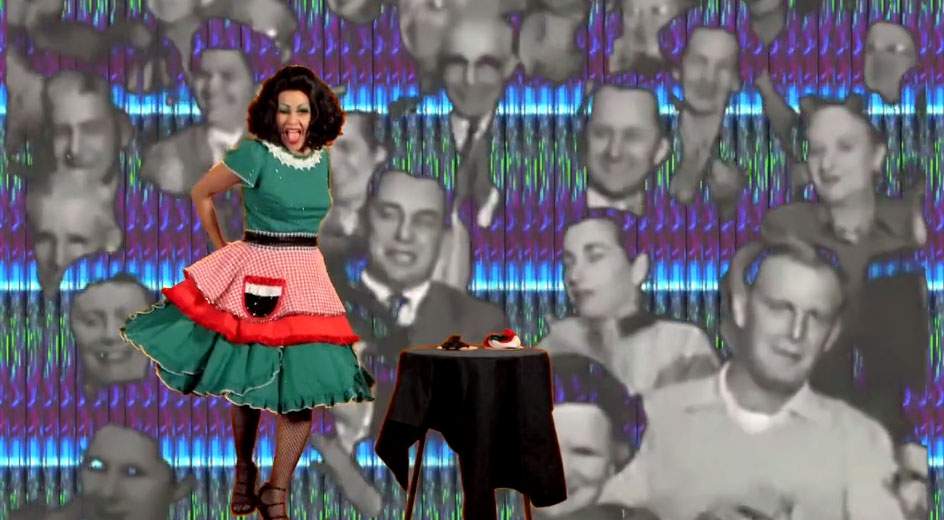USA, a work is removed from a contemporary art exhibition because it was deemed sexually explicit
A contemporary artwork has been removed from an exhibition in San Antonio, Texas, United States, because it was deemed sexually explicit: this is what happened at the exhibition XicanX: New Vision, which opened last Feb. 13 at the Centro de Artes in San Antonio. By decision of San Antonio District Attorney Andy Segovia, the exhibition’s curators, Suzy González and Michael Menchaca, had to remove all reference of the work from the show: it is a video art work by U.S. artist Xandra Ibarra (El Paso, 1979), titled Spictacle II: Tortillera, from 2014, included in the exhibition’s itinerary and intended to be displayed alongside other works by the performer. The whole thing, explains the local San Antonio Express-News, started with the director of the city’s Department of Arts and Culture, Debbie Racca-Sittre: a statement sent by the city administration to the newspaper states that "the city has decided to remove the film Spictacle II: Tortillera from the exhibition due to obscene material that does not conform to our community standards."
In the video, which lasts a total of four minutes(it can be viewed in its entirety at this link), Xandra Ibarra appears as a character she created and has already used for other performances, nicknamed “La Chica Boom,” as she stages a bizarre burlesque show: dancing in front of a table with two tortillas, she first takes off a black thong by putting it inside one of the two tortillas, and then does the same thing with a pair of panties in the colors of the Mexican flag. To the notes of Also sprach Zarathustra by Richard Straus, Xandra Ibarra removes her heavy green dress to remain in a corset that leaves her breasts exposed (covered by two nipple covers), wearing a thong with a strap-on in the shape of a tabasco bottle: in the finale, the artist mimes masturbation with the tabasco bottle, spilling the sauce to “season” the two tortillas. The performance, the artist herself explained, is meant to mock stereotypes, certain lowbrow Mexican humor, and certain taboos, including those related to gender and race prejudice. The video, in fact, also wants to protest homophobia, racism, and sexism.
Ibarra, reached by ARTnews magazine, let it be known that she expected the video to be censored, since this is not the first time her work has caused controversy, and she therefore took it philosophically, considering the episode a moment to reflect on the “cultural crisis” of our time. The two curators did not appear to take the same view, who openly spoke of censorship and started a petition to have the work reintroduced to the exhibition. In the text, González and Menchaca, after listing Xandra Ibarra’s credentials, wrote that “the video was designed to challenge traditional ideas about Mexican femininity and derives from the historical strategies adopted by LGBTQAI+ artists to intervene on the issue of sexualized and homophobic violence. [...] There is no doubt that Xandra Ibarra’s work has artistic value. So, we oppose this censorship and see it as a ban on queer, sexual, feminist and Latina creative expression, an act of discrimination and blatant homophobia.” With the petition, the curators are asking the city of San Antonio to reconsider its position on the work and also to reconsider its definition of “obscenity,” “which is rooted in a tradition of silencing sexual expression.” The city’s response to Xandra Ibarra’s work, the editors write, “is fundamentally illegitimate, unjust, and deserves to be reconsidered.”
Segovia, for his part, responded, again speaking to the San Antonio Express-News, that the measure was taken not because of the content of the artwork (the decision “has nothing to do with the message,” he explained, “the exhibition in fact has many works that have to do with transgender and Latino issues. The exhibition clearly indicates that the city is not judging the work from the point of view of content.” It is therefore an issue of form: the work, Segovia said, “is a simulated sexual act, and the city does not want it to be shown in one of its facilities because it is too explicit.”
Also supporting González and Menchaca’s arguments is the National Coalition Against Censorship, which has written a letter to the mayor of San Antonio condemning the censorship (“By removing Ibarra’s work from the exhibition at the Centro de Artes, the City of San Antonio is likely violating the artist’s right to freedom of expression and exposing the city to both bad publicity and legal consequences”) and demanding the work’s reinstatement.
Pictured: Xandra Ibarra, a frame from Spictacle II: Tortillera (2014)
 |
| USA, a work is removed from a contemporary art exhibition because it was deemed sexually explicit |
Warning: the translation into English of the original Italian article was created using automatic tools. We undertake to review all articles, but we do not guarantee the total absence of inaccuracies in the translation due to the program. You can find the original by clicking on the ITA button. If you find any mistake,please contact us.





























